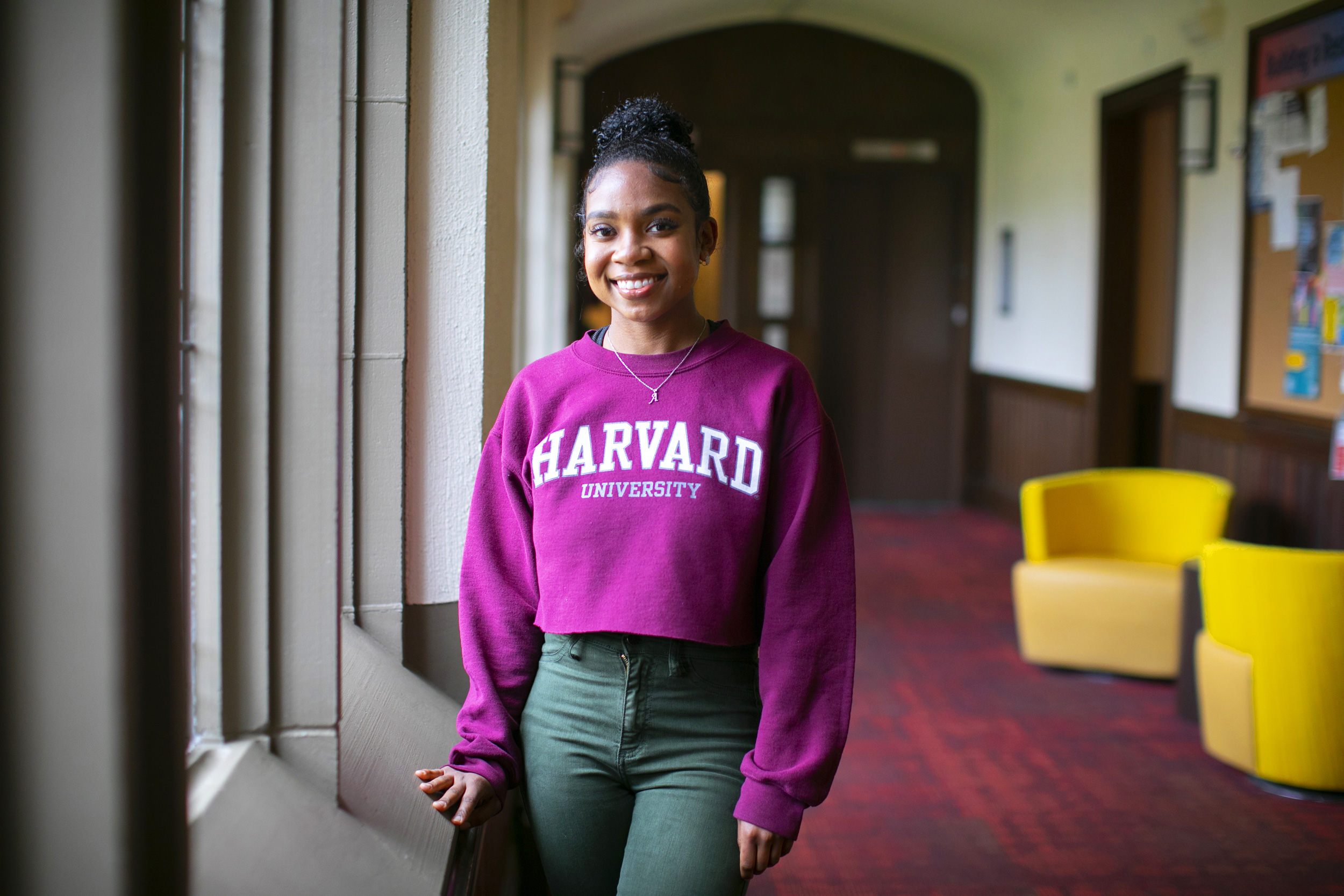
Stephanie Mitchell/Harvard Staff Photographer
Love of grandmother’s garden blossoms into climate justice activism
Aliyah Collins’ nonprofit aims to help HBCU students make spiritual connections with nature, launch conversations about environmental equity
This story is part of a series of graduate profiles ahead of Commencement ceremonies.
For Aliyah Collins, the road to finding her calling for environmental justice started in her hometown of Jackson, Tennessee, passed through Chicago, with a stop in Ghana, and then to Cambridge, Mass.
It started in the garden of her grandmother, Carolyn Faye Ozier, who grew herbs, flowers, and other plants in the front yard of her house, not far from her granddaughter’s. As a child, Collins hung around Ozier’s porch to enjoy family gatherings and the beauty of the garden, where the sight of pink four o’clock flowers that bloom in the afternoon always made her smile.
Collins, who dreamed of basketball stardom back then, was too busy putting in time on the court to do any gardening, but now she recognizes that the seeds of her ideas about the power of nature were planted then and there. They would ultimately lead to a commitment to work for climate justice.
“One of my favorite things growing up was sitting on the porch of my grandmother’s house in front of her garden,” said Collins, who will graduate this spring with a master’s degree in divinity. “Back then, it didn’t seem that having a garden was a big deal, but when I remember my childhood, I always think of my grandmother’s garden.”
Now, Collins has launched the Eco-Healing Project to help historically Black colleges and universities (HBCUs) plant on-campus gardens where students can practice spiritual care and find ways to cope with stress, anxiety, and other mental health issues by gardening and building connections with nature. She is particularly interested in working with schools in the aftermath of climate disasters.
A graduate of Fisk University, a historically Black university in Nashville, Collins knows from her own experience and those of friends and relatives who attended HBCUs that most lack community gardens or green spaces, which have been shown to foster a sense of well-being. “We don’t have equitable access to green spaces,” said Collins. “Nature is so healing and can offer a solution to help improve our mental health. Building gardens on HBCU campuses will give us spaces where we can come together and heal.”
The lack of access at HBCUs mirrors that in African American and minority neighborhoods generally, which tend to have smaller parks, fewer green spaces, and more hazardous waste sites than white areas, a legacy of segregation, redlining, and racial and income disparities. When Collins did a summer internship in the Hyde Park neighborhood of Chicago, she was shocked to learn there were Black children there who had never been to bordering Lake Michigan.
Like many environmental activists, Collins believes climate-change issues are also racial-justice issues. Minority neighborhoods tend to be disproportionately affected by natural disasters and climate change. During Collins’ senior year at Fisk, a tornado devastated several Nashville neighborhoods, among them HBCU Tennessee State University and several Black communities, which lacked resources to recover quickly. Collins, like many other residents, did not have electricity for days.
“When we talk about lack of resources, this includes lack of trees in your neighborhood that can protect you from extreme heat or lacking clean water to drink, like it happened in Flint, Michigan,” said Collins. “When we talk about climate issues, we must talk about environmental justice.”
Her time in Ghana helped foster her interest in the nexus of spirituality, nature, and political action. Collins spent a semester abroad in the West African nation in her junior year studying political work and organizing along with traditional religious practices and Black spirituality — all of it eventually leading her to the Divinity School, which allowed her to engage with various spiritual perspectives on climate, nature, and justice.
Collins is getting ready to launch a program this fall at Bennett College in Greensboro, North Carolina, with $20,000 from the Tom’s of Maine Incubator program to support minority environmental leaders. She plans to work with the college’s green team to start raising funds to build garden beds and offer programs to foster new ways to view nature as a sacred thing that deserves protection from pollution and climate change.
Former Divinity School classmate Tracey Robertson Carter met Collins when both joined with other Black students in an effort to create opportunities for uplifting Black excellence. Robertson Carter, who has been involved in various Florida arts organizations and is on the board of the educational nonprofit Shelburne Farms, commended Collins’ project, whose impact will be felt beyond HBCUs’ campuses.
“Her project to create gardens at HBCUs will help engage students with environmental issues but will also help the greater community understand the environment’s impact on society, and on well-being and mental health,” said Robertson Carter. “Aliyah is a wonderful young person who is developing tools to help uplift and promote restorative justice for the Black community.”
As for plans after graduation, Collins hopes to move to Chicago, where she will manage her nonprofit, work in sustainability and climate justice issues, and promote spiritual care for underserved communities. And she is very happy that her grandmother now knows she provided the inspiration for Collins’ career.
“I went home for Easter, and I saw my grandmother,” said Collins. “They had put me on the local news and my grandmom asked me, ‘How did you get into this?’ I told her, ‘Because of you. You’re the first person I thought of who cared about plants.’ She was like, ‘Oh, OK. Thank you.’ My grandmom, she can grow anything.”




